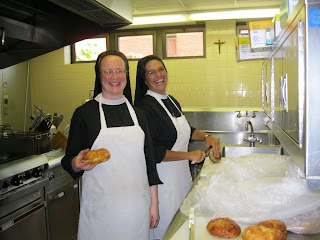 I was reading a book yesterday about secular saints. The author commented on how many saints are priests, nuns, monks...and made the point that it is not necessary to be in religious life in order to be a saint.
I was reading a book yesterday about secular saints. The author commented on how many saints are priests, nuns, monks...and made the point that it is not necessary to be in religious life in order to be a saint.True statement. Today's feast is a celebration of that fact.
We are, each of us, called to sanctity of life. We each have a unique path to God and show forth his glory in an unrepeatable manner.
So then, why so many nuns and brothers and priests and sisters... in the rolls of the saints?
Because that's our career. If we aren't saints, we're slacking on the job. The "way of perfection" does not mean that everyone who enters religious life is perfect (don't we wish!) or holy (ditto!). What it means is that those who undertake this life and serious about going directly to God without hindrance. They take up the challenge of holiness, strip themselves of anything that can hold them back (possessions, people, their own will) and determine to live a lifestyle that maximizes their chance for sanctity.
That's what religious life is about - the choice of holiness as a profession.















































